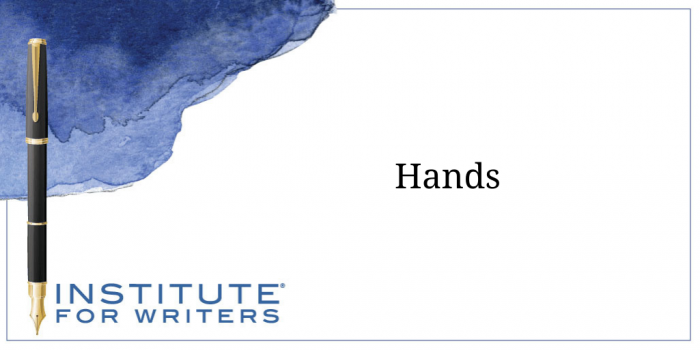1000 N. West Street #1200, Wilmington, DE 19801
© 2024 Direct Learning Systems, Inc. All rights reserved.

We teach our students how to write and get published!
View our Course Catalog >
My hands are cracking from washing them so often these days. Yours too? How about, in addition to tending to your hands with soap and water, writing a poem to and for and about them, those prehensile and oh-so-versatile tools. How about we give a nod of thanks to the hands that serve us each and every day—breakfast makers, trumpet holders, cat stroke-rs, forehead soothers, hole diggers, fence builders, and so much more.
In her poem “Consider the Hands That Write This Letter,” Aracelis Girmay watches herself in the act of writing, takes note of what she observes and is compelled to reflect upon: “Left palm pressed flat against the paper…” “the right hand, & how it is a fist…” While you’re engaged in an activity requiring your hands, step back for a moment and watch what you’re doing, noting the miniscule movements and the larger ones your hands tackle.
Watch someone else use their hands. I love the silky feeling of running my fingers through my hair or my husband’s. It makes me think about my mother who lost her hair when she was young and then I’m taken back to her dexterous hands when I sat at her feet as a girl and she made two braids to hang sturdy and pretty down my back.
When Floyd Skloot, in his poem “Handspun,” writes about his wife at her spinning wheel, “ringed by skeins of multicolored yarn that will become a summer sweater,” he slows time down, and that’s one of the brilliant things that poetry can do. Something that in actual life may take only a few moments gets enlarged with descriptive details. A reader gets brought in to know what the poet’s writing about as felt experience. I love how a poem brings me close to those I’ll never meet and thusly shows me others in their private, rather than public, ways. Reading a poem can be like being let in on a secret.
Remember from the first Poetry Month blog post that a poem doesn’t say everything; it’s not a crime report or a novel! A poem hints at some things while fleshing out others. Look at both these poems online. The poets’ approaches are quite different from each other—from Girmay’s couplets to Skloot’s squat rectangle of words. Girmay’s poem, not only because of how it looks on the page with lots of white space, but because of how she uses language, has a lot of space around and within it. Whereas Skloot’s is compressed.
When I’m writing a poem, in the first drafts, I may not even know it’s a poem; it might be a journal entry or the start of an essay. It’s like when you meet someone new, when writing a poem, I don’t know a lot about what’s before me. Did the poem travel by wind to get to me? Has it brushed its teeth? Hell, does it have teeth or will the words be gummed out of the poem’s mouth? Through writing what’s coming to me (from wherever it’s coming), I get to know not only its content but its form. If it’s a poem, will it be squat like Skloot’s or long and lean like Girmay’s? It’s like you have to listen to the words and to beyond the words to discover what it is you’re creating.
Both are narrative poems—they tell a story—but in such different ways. Girmay doesn’t stay in the present; she moves back in time, toward the middle of the poem, saying that she once saw snow fall “like rice flung from the giant’s wedding.” She leaves her observation of herself writing and returns to it throughout. In “Handspun,” Skloot keeps closer to his immediate story and reflects, not on other memories, but on the act of his wife spinning.
Donald Hall said, “Poetry is the unsayable said.” Remember you’re using language to go beyond language and to enter the essence of experience which is wholly inclusive of action, thought, and feeling.
Observe something and try both approaches to writing it—move back in time and sideways in one poem and in the other, keep yourself tied to what’s right before you. And remember, there’s more than one way to write a poem. Sometimes my words come fast and furious and other times they linger at the bar before coming home to me and arrive slurring their speech. I love best the rush of language that grabs me and forces me to the page and grow impatient with the lingerer but have come to (mostly) accept that poems have wills of their own; I’m only partially in control.
Patrice Vecchione is the author of the poetry book, My Shouting, Shattered, Whispering Voice, available here. Patrice offers some rather surprising rules for writing, including 25 writing inspirations.
1000 N. West Street #1200, Wilmington, DE 19801
© 2024 Direct Learning Systems, Inc. All rights reserved.
1000 N. West Street #1200, Wilmington, DE 19801
© 2024 Direct Learning Systems, Inc. All rights reserved.
1000 N. West Street #1200, Wilmington, DE 19801
© 2024 Direct Learning Systems, Inc. All rights reserved.
1000 N. West Street #1200, Wilmington, DE 19801
© 2025 Direct Learning Systems, Inc. All rights reserved.
1000 N. West Street #1200, Wilmington, DE 19801
©2025 Direct Learning Systems, Inc. All rights reserved. Privacy Policy.